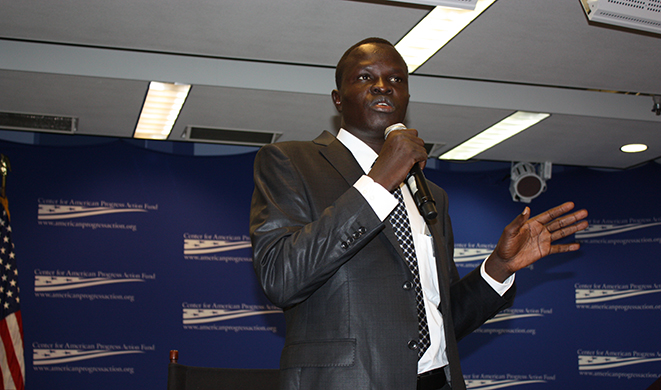
On July 11, The Enough Project hosted Joseph Akol Makeer for a presentation at the Center for American Progress. Makeer,a former Lost Boy of Sudan, fled his home in the south with thousands of Lost Boys in 1987 who feared being killed by or recruited to fight for the Khartoum regime.
Makeer began by passionately describing the four-month trek that landed him in Ethiopia only to be forced back into Sudan by the new Ethiopian regime which had ties to Khartoum. Once more, the Lost Boys fled aerial attacks, famine, and disease in southern Sudan and finally reached the Kenyan refugee camp of Kakuma in 1992. Along with whom he calls his “brothers”, Makeer lived at Kakuma for ten years until he accepted the United States’ offer of resettlement which sent him to Fargo, North Dakota. Makeer humorously explained to the audience of students his unique perspective of life as a refugee, from the culture shock of being placed in a predominately white and English-speaking community, to seeing snow for the first time and needing clarification from his American friend that it was not ash from an atomic bomb. While in North Dakota, Makeer studied at North Dakota State University and after graduating in 2008 realized that he needed to use his experience not to better himself, but to help better his community in southern Sudan.
Living in Fargo, Makeer found opportunities to bring attention to the crisis in Sudan. Reflecting on his journey, he stated: "Courage came by itself. If others keep moving, why not me?" This propelled him to publish his memoir, “From Africa to America”, and later produce the documentary of that journey in the film "African Soul American Heart". Makeer now works on the South Sudan Relief and Rehabilitation Commission. Makeer also started the non-profit and boarding school, African Soul, American Heart, which promotes education, protection, and empowerment of orphaned girls in Duk Payuel, Jonglei State.
Akshaya Kumar, Enough Project’s Sudan and South Sudan policy analyst, joined Makeer at the end of his presentation to address practical ways that human rights activists in the U.S. can help advocate an end to ongoing crises in the Sudans. Kumar encouraged individuals to reach out to their members of Congress in the House and ask them to co-sponsor H. Res. 1692. Additionally, she emphasized that activists must also ask members to pressure the Obama administration to work with Sudan and South Sudan on democratic transformation. Makeer urged the audience to help with capacity building in South Sudan either directly through their work or indirectly by advocating Congress and the administration to work with the South Sudan government. In his closing remarks, Makeer reminded the audience that because of technology, internet, and social media, the world is a small place [now] and there is no excuse for not responding to the needs of those who are suffering.
Photo: Joseph Akol Makeer speaks at the Center for American Progress (Enough Project)

